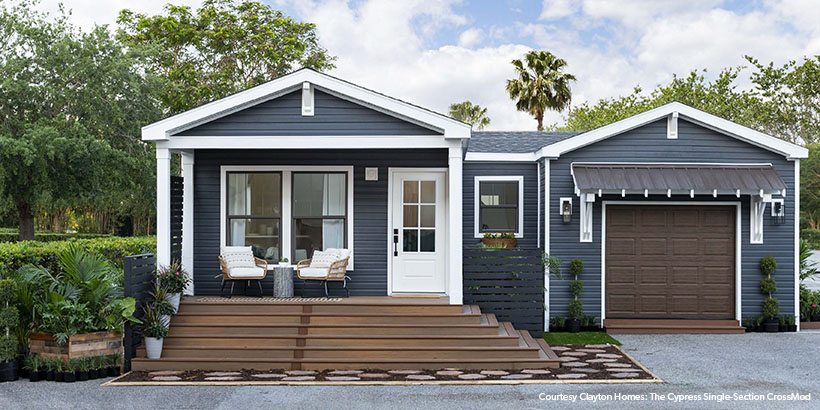A manufactured home is a path to homeownership that is often overlooked. Offering both quality and value, a manufactured home could be an affordable option to get you into a home of your own.

What Is a Manufactured Home?
A manufactured home is a house built in a factory rather than on the land where it will be placed. These homes are constructed using the same building materials as site-built homes but take less time to build and are typically more affordable because the efficiency of the factory building process lowers costs.
The home may consist of a single section or two or more sections that are built on a permanent steel frame (chassis) in a factory and transported to your property. Once it arrives, it will be placed on the land that you own or lease, or in a manufactured housing community.
Modern manufactured homes offer attractive design options that are nearly indistinguishable from site-built homes. For example, modern factory-built homes such as CrossMod® homes are a particular type of manufactured home that have the features and aesthetics of site-built homes, such as pitched roofs, permanent foundations, porches and garages.
Are Manufactured Home Built as Well as Site-Built Homes?
Manufactured homes are safe, strong and durable. They are inspected to meet or exceed standards set out in the U.S. Department of Housing and Urban Development’s (HUD’s) Manufactured Housing Construction and Safety Standards, commonly known as the HUD Code, which applies nationwide. The safety standards include:
- Design and construction.
- Strength and durability.
- Fire resistance.
- Heating, plumbing and air conditioning.
- Thermal and electrical systems.
- Energy efficiency.
- Overall home quality.
With the HUD Code seal of approval, manufactured homes also meet regional standards for roof load, wind resistance, thermal efficiency, safety and durability, which vary depending on where you live.
Note that manufactured homes differ from other factory-built homes. They aren’t recreational vehicles or mobile homes*, which are built on wheels. And they aren’t modular homes, which are permanently installed on your property and certified to meet or exceed state, local and regional building codes rather than the HUD Code.
What Are the Benefits of Purchasing a Manufactured Home?
There are several advantages to buying a manufactured home.
Manufactured homes typically are more affordable than site-built homes. The average price of a new, single-section CrossMod home today is around $200,000 including the land, versus more than $500,000 for a new site-built home.
Manufactured homes are energy efficient. The HUD Code ensures that manufactured homes achieve a certain energy efficiency standard, which can save you money on your monthly utility bills and help keep your home environment comfortable. Manufactured homes are required to have insulation within the walls and under the home around its base, energy-efficient windows and high-efficiency water heaters. The kitchens and bathrooms have energy-saving appliances and lighting, as well as water-saving plumbing fixtures and faucets.
Another consideration is the long-term value of manufactured homes. According to the U.S. Federal Housing house price index, a manufactured home appreciates in value similar to a site-built home.
How Can I Finance a Manufactured Home?
There are mortgages products specifically designed for buyers of manufactured homes, including some low-down payment options.
For example, Freddie Mac’s CHOICEHome® offers financing for CrossMod homes with a down payment as low as 3% of the purchase price. This includes financing for CHOICEHome-certified single-section manufactured homes, which can be even more affordable than multi-section homes.
In addition, Freddie Mac’s Home Possible® mortgage helps qualified homebuyers buy traditional manufactured homes with down payments as low as 5% of the purchase price.
When considering buying a manufactured home, be sure to confirm the availability of land, access to utilities and any zoning restrictions in the area where you plan to place the home.
Speak with your lender about the financing options available to you and which may best suit your needs.
* A recreational vehicle or travel trailer is built to the recreational vehicle code, which may not be suitable for year-round living, and is designed to be moved frequently.
Last reviewed: September 11, 2025
My Home in your inbox
Sign up to receive resources, tools and tips about buying, owning, refinancing, selling and renting a home in your inbox.